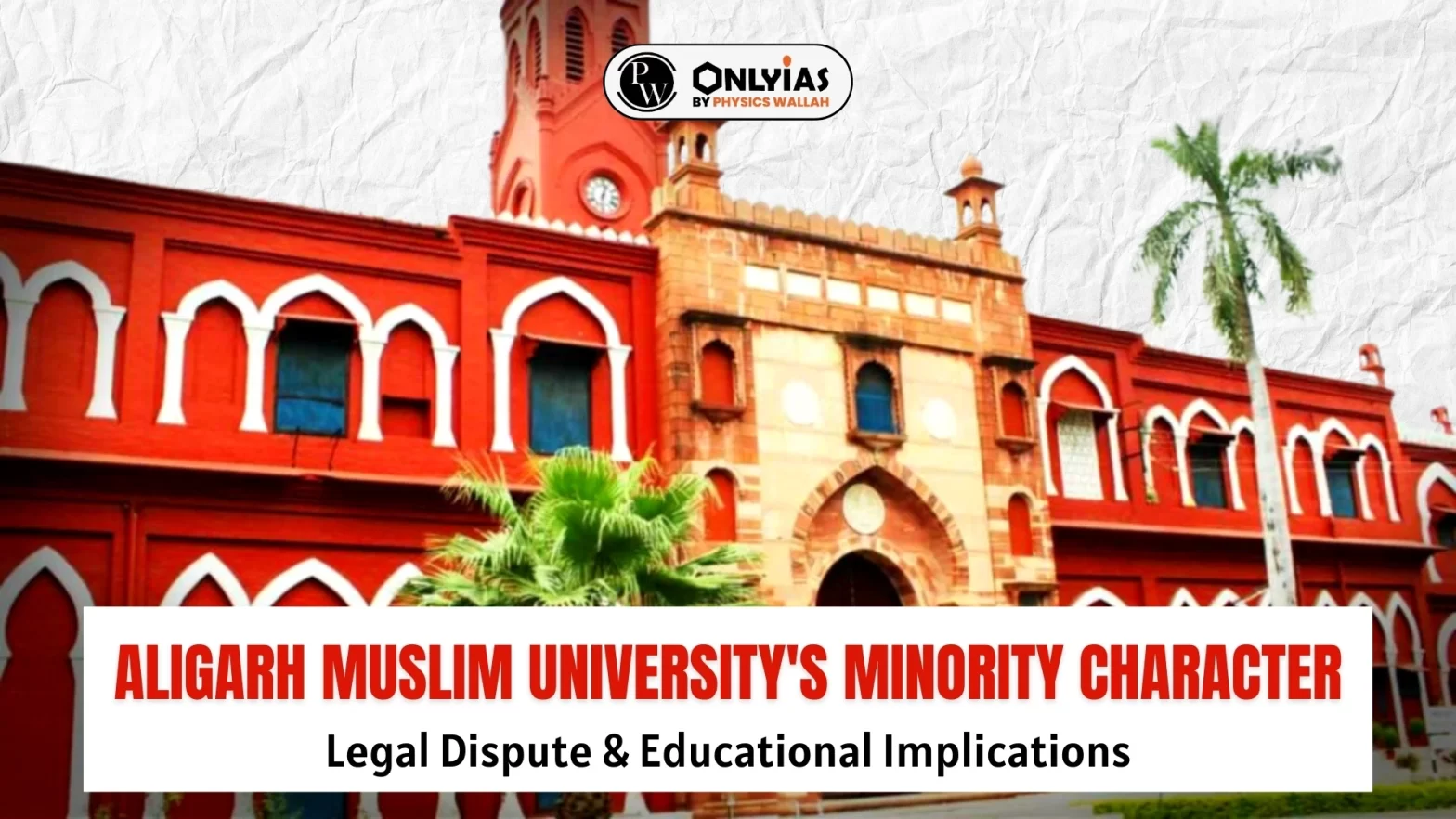Context: This editorial is based on the news “Minorities’ right to open institutions not for ghettoisation: Supreme Court” which was published in The hindu. A seven-judge Bench of the Supreme Court started hearing the matter of Aligarh Muslim University’s minority character.
- The dispute dates back almost 57 years and has been adjudicated upon multiple times by different courts.
| Relevancy for Prelims: Article 30 Significance, Historical Evolution of AMU, Educational Benefits of Minority Status, Reservation Policy Implications, Union List Placement, T.M.A Pai Foundation Case, Constitutional Commitment to Minorities.
Relevancy for Mains: Minority Character of an Educational Institution-Significance and Challenges, Governmental Role in Educational Development, Socio-Economic Development, Union List Placement and Constitutional Framework. |
What Is Meant By The ‘Minority Character’ of an Educational Institution?
- Article 30(1) of the Constitution empowers all religious and linguistic minorities to establish and administer educational institutions.
- This provision reinforces the Union government’s commitment to foster the growth and development of minority communities by guaranteeing that it will not discriminate in giving aid based on their being ‘minority’ institutions.
Evolution of Aligarh Muslim University’s Minority Character
- Establishment: AMU was established in 1875 as the Muhammadan Anglo-Oriental (MAO) College 1875 by Sir Syed Ahmad Khan.
- In 1920, the British government in India passed the Aligarh Muslim University (AMU) Act, 1920 a central legislation which enabled MOA and a few other colleges to be affiliated with it.
- Amendments to the Act: The central government passed two amendments to the law in 1951 and 1965. The amendment changed the structure of the university’s governing body and gave powers to the President of India to nominate its members.
Benefits for Aligarh Muslim University (AMU) as Minority Institution:
- Autonomy: AMU will have the constitutional right under Article 30 to establish and administer an educational institution of the Muslim community’s choice. This will give the university more autonomy.
- Addressal of Educational Backwardness: AMU can reserve up to 50% seats (Sachar Committee Report) for Muslim students in admissions for all courses. This quota will help address the educational backwardness of the Muslim community which has been highlighted in various reports.
- Recruitment Flexibility: As a minority institution, AMU will have more flexibility in recruitment, especially to ensure adequate representation of the Muslim community in its faculty and leadership positions.
- Upgradation: AMU will be eligible for grants and aids from the government specifically earmarked for minority institutions. This funding can be utilized to set up centers of excellence, upgrade infrastructure etc.
- Sustaining of Foundational Vision: The tag of a minority institution will provide legal sanctity to AMU’s character that was originally envisaged as a university for promoting modern, secular education among Muslims.
Challenges to AMU’s Minority Status: Reservation Concerns and Legal Precedents
- Reservation for Backward Classes: It is ranked 9th across universities and autonomous institutions in India by the Ministry of Education’s National Institutional Ranking Framework (NIRF) in 2023.
- Hence, if declared a minority institution it will not be required to implement the reservation policy under Section 3 of the Central Educational Institute (Reservation in Admission) Act, 2006 (as amended in 2012).
- Section 3 of the act mandates reserving seats for Scheduled Castes, Scheduled Tribes, other backward classes (OBC), and economically weaker sections (EWS).
- Listed Under Union List: The Aligarh Muslim University and Banaras Hindu University have been placed in the Union List in the Seventh Schedule of the Indian Constitution. Any institution mentioned in the Union list can never be a minority institution.
- T.M.A Pai Foundation vs State of Karnataka: In this case, the SC held that the minority institutions may have distinct admission processes that are fair, transparent, and based on merit.
Conclusion:
Lack of education among the minorities section, especially muslims is a reason for their backwardness. Thus, there is a need to balance the rights of minorities and the educational rights of other backward Sections.
![]() 13 Jan 2024
13 Jan 2024
